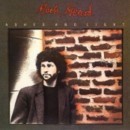For seven albums now,
Mark Heard has been tracking the failings and
foibles of the human
condition. In his latest acoustic effort, Ashes
and Light, the musical poet further
examines the bruised, calloused, or questioning
hearts of normal, 1980s people. There’s so
much substance packed into Heard’s songs that it’s
difficult to give them justice in a brief
review. For starters, the personal nature of Heard’s
lyrics is heightened by the fact that he
produces his own albums, tracking the tunes at his
home studio,
Fingerprint Recorders.
Ashes and Light opens with “The Winds of
Time,” a jangling juxtaposition of mid-’60s,
Byrds-like licks with ’80s production values. Over
this bedrock, Heard reminds us that “It
takes a saturated soul / To withstand the winds of
time.” “True Confessions” displays Heard’s
tendency to write and perform in styles quite
similar to a variety of other well-known artists,
while maintaining his own musical identity. Here, he
sounds like T-Bone Burnett doing Bob Dylan.
But it perfectly suits the lyric, “our virtue lies
worthless as rumor.”
A country arrangement highlights the melancholy
message of “I Know What It’s Like to Be Loved.”
As Christians, we do know true love, yet we
often accept an imitation. “Washed to the
Sea” speaks of pain and how time will heal all
suffering, though that resolution is seldom seen.
Heard harkens back to Rhymin’-era Paul Simon
on the ballad “We Believe So Well.” Beware
the stinging indictment couched in its gentle
melody: “Don’t we take exclusive pride / That we
abide so far from hell.”
Heard’s intellect sometimes gets the better of
him (and us), as on side two’s opener, “Straw
Men.” Boasting one of the album’s strongest hooks,
the song is weakened by lyrics such as,
“It’s this pious anhedonia that he loves so well.”
(I confess, I had to look up the meaning
of anhedonia). “Straw Men” is an otherwise
excellent observation on the way we tend
to pass judgment without basis.
More of life’s downtrodden characters inhabit the
next pair of songs. In “Can’t See Light”
Heard sings of “Billy [who] walks around with a
callus on his brain,” and in “Age of the
Broken Heart” he sings of an unnamed “she” who’s
“fought a war with her callousness / And her
callousness won.” A line from “Age of the Broken
Heart” poses a rhetorical question for both
songs: “What is the crime in crying out to God?” Yet
in “Can’t See Light” Billy prefers not
to deal with that question, because of the
responsibility—and pain—that knowing the truth
carries.
“Threw It Away,” a wonderful blues
update of the Garden of Eden story, could apply to
anyone
at any time. The lyric “[they had] feet of clay
and an inner light” illustrates perfectly the
walking contradiction we create. The album closes with
“In Spite of Himself,” an acoustic piece
most reminiscent of “Eye of the Storm,”
containing encouragement for those who feel maligned
and misused by friends.
The characters that populate Heard’s lyrical
landscapes never seem to have a good time, but
that’s not really a criticism. There is more to
life than good times and self-pleasure, and
we need writers like Heard to remind us of that. If we
overlook Heard’s occasional wordiness,
we detect notes of optimism permeating even his
darkest lyrics.
An extension of the acoustic mood of Eye of the
Storm, Ashes and Light does
not signal a new folk direction for Heard.
Ashes... boasts a strong backbeat and rhythmic
base with elements of blues, as well as Heard’s
distinctive country twist. You probably won’t
be humming any of Ashes and Light‘s
melodies after one or two hearings, but it’s
still
a very enriching album.
Bruce Brown ( CCM, October 1984 )
Copyright © 1984 CCM Magazine
Ashes and Light ~ Lyrics /
Credits /
Liner Notes /
DISCOGRAPHY
